This week the President delivered the annual State of the Union Address to a joint session of Congress, while the House held its first hearing of the new 118th Congress. Elsewhere Career Technical Education (CTE) champions in the House introduced a resolution designating February as CTE Month while lawmakers reintroduced legislation that would greatly expand postsecondary CTE opportunities for learners across the country.
President Biden Delivers State of the Union
 On Tuesday, February 7, President Joe Biden delivered the annual State of the Union address to a joint session of Congress. The speech focused on the President and Congress’ accomplishments over the last two years, including significant investments in advanced manufacturing, the nation’s infrastructure, and other domestic priorities, while also reiterating a need to “finish the job” in the 118th Congress—a recurrent theme that the President returned to throughout the evening. Ahead of the address to the joint session of Congress, First Lady Jill Biden’s guests included Kate Foley– a 10th grade computer-integrated manufacturing student who the First Lady had met last year during a visit she and other Administration officials made to CTE programs in Rolling Meadows High School. In addition, Rep. Glusenkamp Perez (D-WA) brought Cory Toppa, a construction, engineering design, and manufacturing teacher at Kalama High School and the director of CTE for the Kalama school district as her guest during the speech.
On Tuesday, February 7, President Joe Biden delivered the annual State of the Union address to a joint session of Congress. The speech focused on the President and Congress’ accomplishments over the last two years, including significant investments in advanced manufacturing, the nation’s infrastructure, and other domestic priorities, while also reiterating a need to “finish the job” in the 118th Congress—a recurrent theme that the President returned to throughout the evening. Ahead of the address to the joint session of Congress, First Lady Jill Biden’s guests included Kate Foley– a 10th grade computer-integrated manufacturing student who the First Lady had met last year during a visit she and other Administration officials made to CTE programs in Rolling Meadows High School. In addition, Rep. Glusenkamp Perez (D-WA) brought Cory Toppa, a construction, engineering design, and manufacturing teacher at Kalama High School and the director of CTE for the Kalama school district as her guest during the speech.
During the speech, the President touched on a wide range of issues, including universal preschool for three- and four-year olds, raising teacher salaries, and calling on Congress to provide greater resources for digital connectivity. However, the President consistently highlighted the centrality of education and workforce development as part of America’s ability to compete within the wider global economy. Notably, the President touched on Career Technical Education (CTE) saying, in part, “Let’s finish the job, and connect students to career opportunities starting in high school, provide access to two years of community college, the best career training in America, in addition to being a pathway to a four-year degree. Let’s offer every American a path to a good career, whether they go to college or not.”
Reinforcing the Biden Administration’s sincere and growing interest in CTE, U.S. Secretary of Education Miguel Cardona visited high school career academies in Omaha, Nebraska the following day to discuss students’ experiences in these programs. Advance CTE was proud to honor this program as an Excellence in Action awardee in 2015, highlighting the program’s exemplary performance which was on full display as part of the Secretary’s visit this week. As shared by the U.S. Department of Education (USED), the visit was also intended to reinforce Secretary Cardona’s recent speech outlining his Department’s priorities for the coming year, which include a focus on strengthening CTE pathways for students. A full transcript of the President’s State of the Union Address can be accessed here.
House Education Committee Hosts First Hearing
The newly renamed House Education and the Workforce Committee, Chaired by Rep. Virginia Foxx (R-NC) held its first hearing this week titled, “American Education in Crisis.” Witnesses included Virginia Gentles, Director of the Education Freedom Center at the Independent Women’s Forum, Colorado Governor Jared Polis, Scott Pulsipher, the President of Western Governors University, and Monty Sullivan, the President of the Louisiana Community and Technical College System. The wide-ranging hearing was intended to highlight aspects of the committee’s likely agenda over the next year ranging from K-12 and postsecondary education to workforce development. During the hearing several CTE topics were discussed at length, including the need to greatly expand postsecondary CTE opportunities by enacting legislation that would expand federal Pell grant eligibility for high-quality, shorter-term CTE programs.
Hearing witnesses, along with an array of committee members on both sides of the aisle, also voiced support for these much needed reforms to the nation’s postsecondary education system. “The single most important step Congress can take in helping address our nation’s skill shortage is to immediately authorize the use of Pell Grants for workforce programs. . . [I] strongly urge Congress to come to consensus on legislation that, when passed, will enable a significant increase in the number of students across the country who will have a new opportunity in how they improve their skills” Monty Sullivan shared as part of his testimony.
Beyond short-term Pell reform, the hearing also touched on the need to reauthorize the Workforce Innovation and Opportunity Act (WIOA) and the Higher Education Act (HEA), most notably by more tightly aligning these federal investments in future legislative updates. In particular, witnesses spoke about the importance of wrap-around services and developing integrated systems of education and workforce development that more effectively ensured learner and worker success. Witnesses also voiced strong support for expanding work-based learning opportunities, particularly apprenticeship programs and called for a broadening of federal support for multiple postsecondary pathways that lead to opportunity. An archived webcast of the more than three hour hearing can be found here.
House Lawmakers Reintroduce the JOBS Act
Late last week, a group of bipartisan lawmakers including Reps. Bill Johnson (R-OH), Lisa Blunt-Rochester (D-DE), Michael Turner (R-OH), and Mikie Sherrill (D-NJ), reintroduced the Jumpstarting our Businesses by Supporting Students (JOBS) Act (H.R. 793)– legislation that would expand federal Pell grant funding eligibility to high-quality, shorter-term CTE programs that meet certain criteria. The bill is the House companion to legislation also reintroduced in the Senate last week, which is currently supported by just under half of the upper chamber. Advance CTE is proud to support this legislation and encourages members to reach out to their Representatives to encourage them to co-sponsor the legislation this Congress. More on the reintroduction can be found here.
House CTE Caucus Introduces CTE Month Resolution
On Wednesday, February 8th, House CTE Caucus Co-chairs Reps. Glenn “GT” Thompson (R-PA) and Suzanne Bonamici (D-OR) introduced a resolution recognizing and designating February as National CTE Month (H. Res. 110). The resolution was co-sponsored by a broad bipartisan coalition of 71 Representatives– a new high watermark of support for the annual resolution. Advance CTE and the Association for Career and Technical Education (ACTE) were joined by more than 50 other organizations who also supported the introduction of the resolution this week.
“We are proud to support the 2023 Career Technical Education (CTE) Month resolution as a celebration and recognition of the impact CTE has for learners as they explore and find their career passions, secure meaningful credentials of value aligned to in-demand careers and provide employers with a highly skilled workforce that is responsive to rapidly evolving industry needs,” said Advance CTE Executive Director Kimberly Green. More on the introduction can be found here.
Senate HELP Organizes
The Senate Health, Education, Labor, and Pensions (HELP) Committee– the entity with responsibility over CTE policymaking in the Senate– met for the first time this week to formally organize and adopt rules for the Congress. New HELP Committee Chair Bernie Sanders (I-VT) emphasized his desire to focus on a wide range of healthcare issues, including a focus on the workforce shortages within the sector. Chair Sanders noted that “We desperately need plumbers and carpenters and electricians and yet we don’t have the training capabilities of doing that.” He highlighted apprenticeships as a potential strategy to address these needs and emphasized that he hoped to work together with Ranking Member Bill Cassidy (R-LA) and his colleagues on these issues in the coming Congress.
During remarks, Ranking Member Bill Cassidy (R-LA) emphasized his desire to reauthorize WIOA and HEA, while also identifying reducing the costs of postsecondary education as being another potential area of bipartisan consensus he hoped to pursue over the next two years. The brief organizational meeting also featured high-level remarks from other committee members who highlighted their priorities for the coming Congress. As part of the meeting HELP members adopted rules for the committee unanimously, as well as a budget, before adjourning. An archived webcast of the meeting can be found here.
Steve Voytek, Policy Advisor
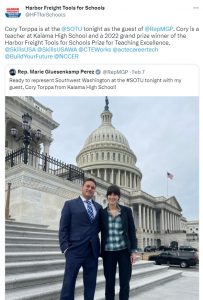 Just two weeks later, First Lady Jill Biden’s guests for the State of the Union (SOTU) address included Kate Foley– a 10th-grade computer-integrated manufacturing student who the First Lady had met last year during a visit to CTE programs in Rolling Meadows High School. In addition, Rep. Glusenkamp Perez (D-WA) brought Cory Toppa, a construction, engineering design, and manufacturing teacher at Kalama High School and the director of CTE for the Kalama school district.
Just two weeks later, First Lady Jill Biden’s guests for the State of the Union (SOTU) address included Kate Foley– a 10th-grade computer-integrated manufacturing student who the First Lady had met last year during a visit to CTE programs in Rolling Meadows High School. In addition, Rep. Glusenkamp Perez (D-WA) brought Cory Toppa, a construction, engineering design, and manufacturing teacher at Kalama High School and the director of CTE for the Kalama school district. 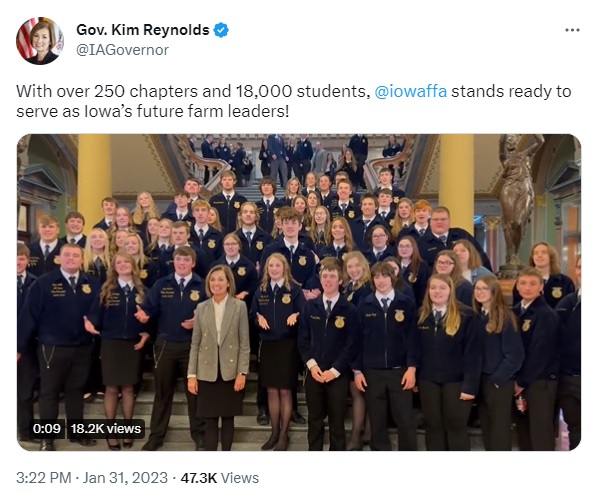
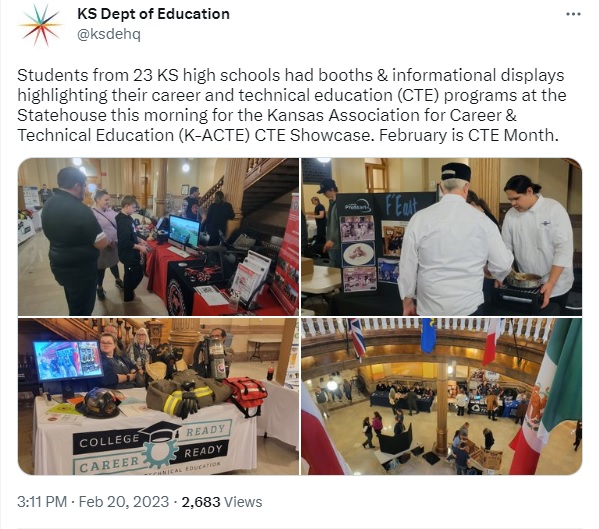
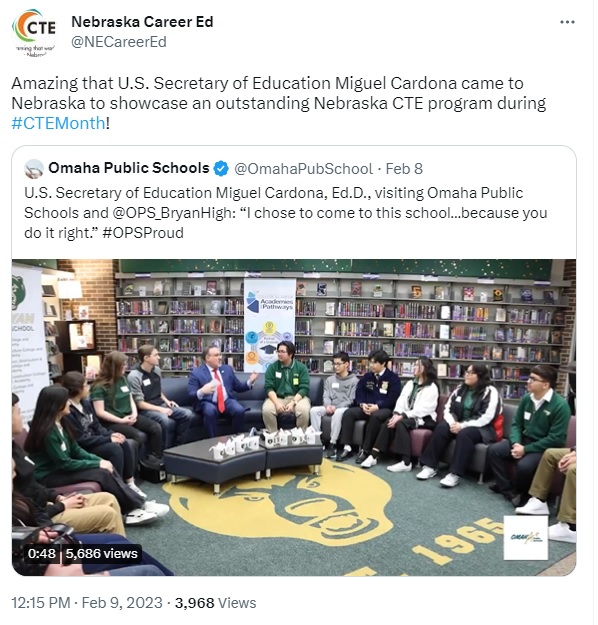
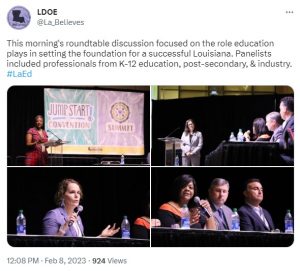
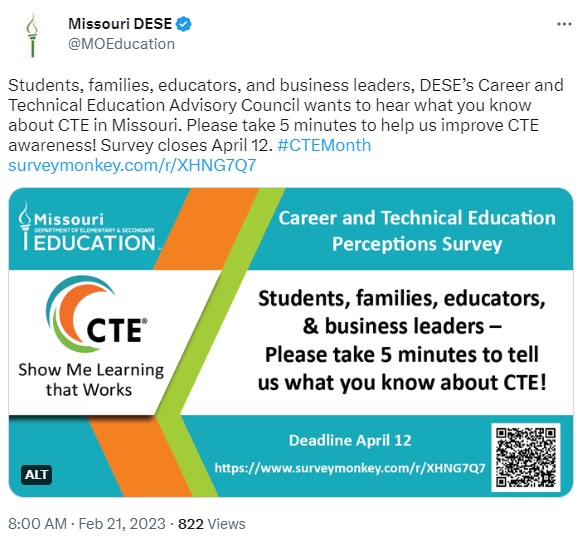
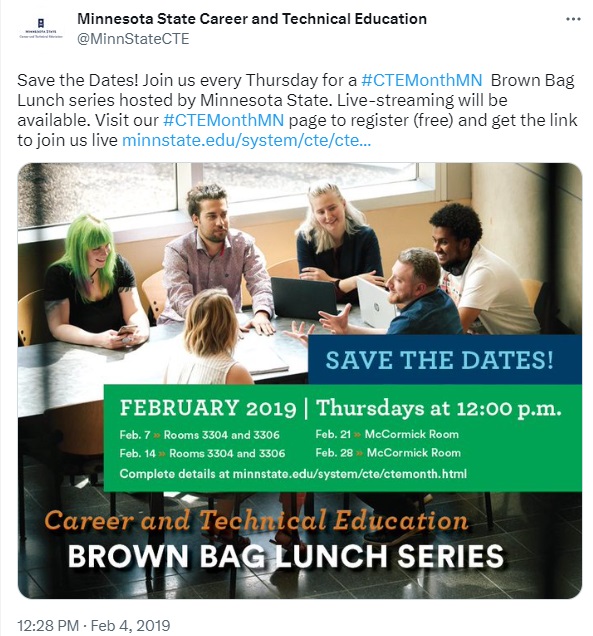
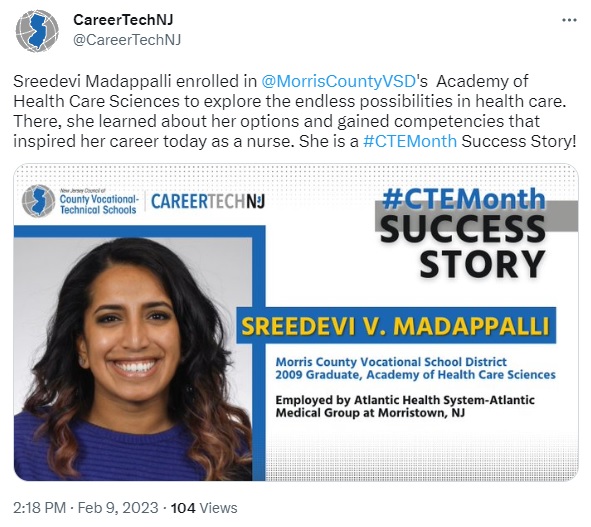
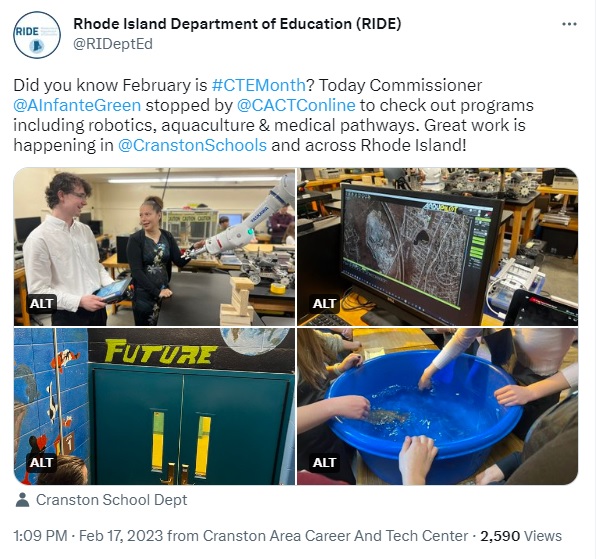


 On Tuesday, February 7, President Joe Biden delivered the annual State of the Union address to a joint session of Congress. The speech focused on the President and Congress’ accomplishments over the last two years, including significant investments in advanced
On Tuesday, February 7, President Joe Biden delivered the annual State of the Union address to a joint session of Congress. The speech focused on the President and Congress’ accomplishments over the last two years, including significant investments in advanced 